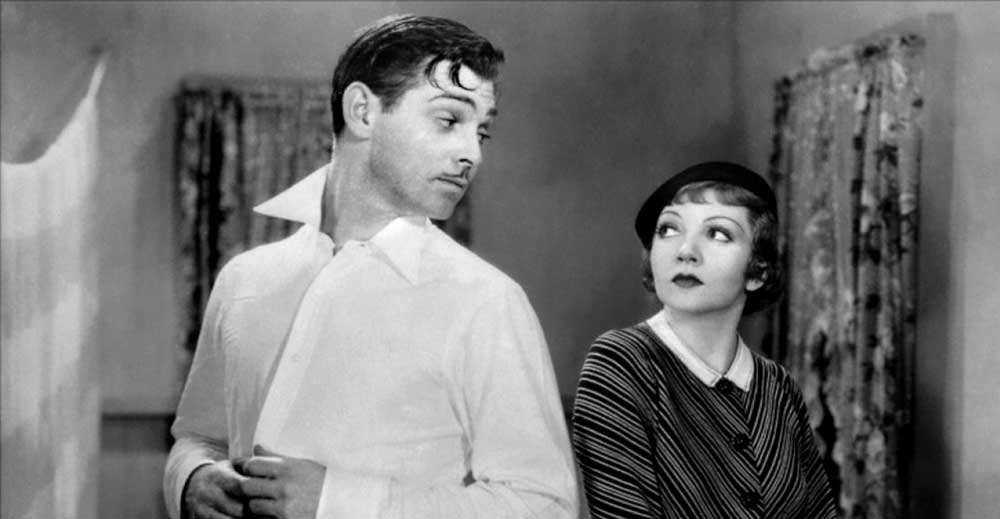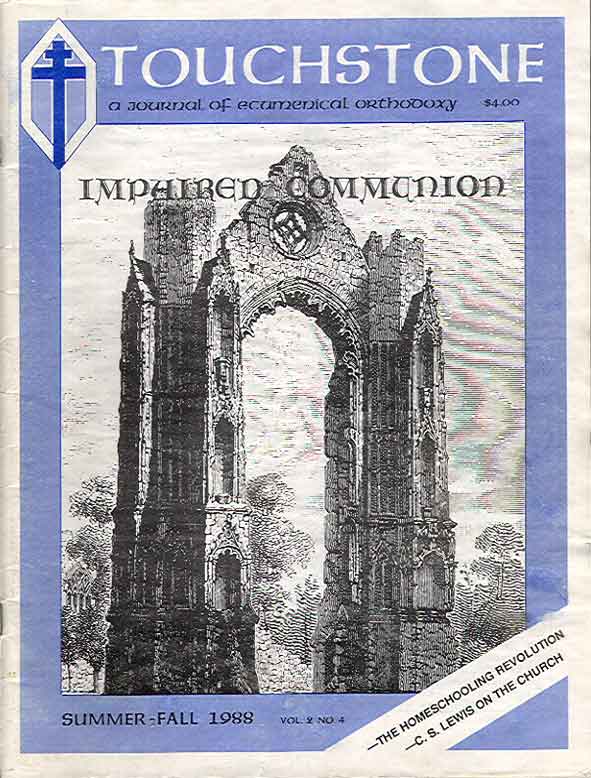Feature
C. S. Lewis, Reluctant Churchman
by Wayne Martindale
The Church has long felt comfortable with C. S. Lewis. He is quoted regularly from the pulpit and in Christian books and periodicals, not to mention the massive popularity of his own works. But Lewis was not always comfortable with the Church. He was repelled by much that he saw, both in the Church as the local congregation of worshipers and the Church as the universal body of all believers. First, the local congregation.
Lewis had no natural fondness for church-going. He found the sermons often dull, and he disliked hymns and organ music, which he described as “one long roar.”1 In his spiritual autobiography Surprised by Joy—speaking of his 1929 conversion to a belief in God (two years before his full conversion to Christianity)—Lewis refers to himself as “the most dejected and reluctant convert in all England.”2 Though reluctant, his reason commanded assent.
He was equally reluctant about church. But he went. Why? He went at first because he felt he ought to: the Scriptures that had won his reasoned assent commanded it. He went later because he learned that it was good for him and necessary for his spiritual growth. In an essay written many years after his conversion, Lewis recalls both his disgust at the services he attended and the grace that came through them:
When I first became a Christian, about fourteen years ago, I thought that I could do it on my own, by retiring to my rooms and reading theology, and I wouldn’t go to the churches and Gospel Halls; . . . I disliked very much their hymns, which I considered to be fifth-rate poems set to sixth-rate music. But as I went on I saw the great merit of it. I came up against different people of quite different outlooks and different education, and then gradually my conceit just began peeling off. I realized that the hymns (which were just sixth-rate music) were, nevertheless, being sung with devotion and benefit by an old saint in elastic-side boots in the opposite pew, and then you realize that you aren’t fit to clean those boots. It gets you out of your solitary conceit.3
Lewis was keener than most about knowing when the Devil was using things like personal taste and, more deadly yet, personal pride to imperil his soul. In The Screwtape Letters, Lewis has the senior devil Screwtape advise junior devil Wormwood regarding a new convert he is trying to tempt:
One of our great allies at present is the Church itself. Do not misunderstand me. I do not mean the Church as we see her spread out through all time and space and rooted in eternity, terrible as an army with banners. That I confess, is a spectacle which makes our boldest tempters uneasy. But fortunately it is quite invisible to these humans. All your patient sees is the half-finished, sham Gothic erection on the new building estate. When he goes inside, he sees the local grocer with rather an oily expression on his face bustling up to offer him one shiny little book containing a liturgy which neither of them understands, and one shabby little book containing corrupt texts of a number of religious lyrics, mostly bad, and in very small print. When he gets to his pew and looks round him he sees just that selection of his neighbors whom he has hitherto avoided. You want to lean pretty heavily on those neighbours. Make his mind flit to and fro between an expression like “the body of Christ” and the actual faces in the next pew. It matters very little, of course, what kind of people that next pew really contains. You may know one of them to be a great warrior on the Enemy’s side. No matter. Your patient, thanks to Our Father Below, is a fool. Provided that any of those neighbours sing out of tune, or have boots that squeak, or double chins, or odd clothes, the patient will quite easily believe that their religion must therefore be somehow ridiculous. At his present stage, you see, he has an idea of “Christians” in his mind which he supposes to be spiritual but which, in fact, is largely pictorial. . . .
Work hard, then on the disappointment or anti-climax which is certainly coming to the patient during his first few weeks as a churchman.4
It is, as Lewis realized, precisely this neighbor presented to our senses whom Christ commanded us to love as ourselves. If we can’t love our neighbor, whom we have seen, how can we love God, whom we have not seen? The local church and its gallery of “types” is our primary laboratory for testing the authenticity of our Christianity. It is there that we learn to love. Lewis calls on us to remember that “next to the blessed sacrament itself, your neighbour is the holiest object presented to your senses.” How else could we respond than in Christian love?
It is a serious thing to live in a society of possible gods and goddesses, to remember that the dullest and most uninteresting person you talk to may one day be a creature which, if you saw it now, you would be strongly tempted to worship, or else a horror and a corruption such as you now meet, if at all, only in a nightmare. All day long we are, in some degree, helping each other to one or other of these destinations. It is with the awe and the circumspection proper to them, that we should conduct all our dealings with one another, all friendships, all loves, all play, all politics. There are no ordinary people. You have never talked to a mere mortal.5
We must apply this knowledge beyond the church, to be sure, but how successful can we hope to be with the frankly skeptical and uninterested if we first fail with those who care enough to find their way among us?
But there’s more. Our ability to grow and our very worship of God to be adequate, requires others; Lewis would say in both the local church and the Church universal. He explains why:
The instrument through which you see God is your whole self. And if a man’s self is not kept clean and bright, his glimpse of God will be blurred—like the Moon seen through a dirty telescope. That is why horrible nations have horrible religions: they have been looking at God through a dirty lens.
God can show Himself as He really is only to real men. And that means not simply to men who are individually good, but to men who are united together in a body, loving one another, helping one another, showing Him to one another. For that is what God meant humanity to be like; like players in one band, or organs in one body.6
And again:
He [Jesus] works on us in all sorts of ways: . . . through Nature, through our own bodies, through books, sometimes through experiences which seem (at the time) anti-Christian. . . . But above all, He works on us through each other.
Men are mirrors, or “carriers” of Christ to other men. Sometimes unconscious carriers.7
Each individual was created with a unique capacity, because of his personality, to see some aspect of God more clearly than anyone else, and we must have the help of others to worship more fully. Lewis’s idea of our worship in heaven is of such a harmony, requiring all of the parts for wholeness.
What, then, of the Church universal? Did Lewis love that? I think not at first. He was too much of a historian. The Church through history has much to repent of. Lewis writes of a false devotion the Church has attracted when it has been militant at arms: when the name of the holy has been usurped to sanction the unholy.
[A] sort of love . . . can also be felt for bodies that claim more than natural affection: for a Church or (alas) a party in a Church, or for a religious order. This terrible subject would require a book to itself. Here it will be enough to say that the Heavenly Society is also an earthly society. Our (merely natural) patriotism towards the latter can very easily borrow the transcendent claims of the former and use them to justify the most abominable actions. If ever the book which I am not going to write is written, it must be the full confession by Christendom of Christendom’s specific contribution to the sum of human cruelty and treachery. Large areas of “the World” will not hear us till we have publicly disowned much of our past. Why should they? We have shouted the name of Christ and enacted the service of Moloch.8
Many have used the grim facts of the organized church’s history to reject Christianity. Others withdraw from the schisms and abuses into an equally dangerous parochialism. With inbreeding comes a blinkered view of the whole and the danger of thinking that those things which we find stressed in our own corner of Christianity is the very whole itself. It is altogether too easy for us to pick and choose those aspects of Christianity which suit us.
Christianity is the total plan for the human machine. We have all departed from that total plan in different ways, and each of us wants to make out that his own modification of the original plan is the plan itself. You will find this again and again about anything that is really Christian: every one is attracted by bits of it and wants to pick out those bits and leave the rest. That is why we do not get much further: and that is why people who are fighting for quite opposite things can both say they are fighting for Christianity.9
It is a short step to institutionalizing those parts we like, relegating the rest to “those other churches.” Just as we can and must balance each other within the local church, so must we embrace the balance provided by the Church universal—the world-wide body of Christ. Lewis is a strong advocate of finding the center:
It is at her centre, where her truest children dwell, that each communion is really closest to every other in spirit, if not in doctrine. And this suggests at the centre of each there is something, or a Someone, who against all divergences of belief, all differences of temperament, all memories of mutual persecution, speaks with the same voice.10
It is precisely at the center that “mere Christianity” is to be found. The danger of inhabiting the periphery is spelled out by his fictional senior devil Screwtape, who sees in imported ideas (non-biblical ideas) an opportunity to divide and weaken us:
[Senior devil Screwtape to junior devil Wormwood]: The real trouble about the set your patient is living in is that it is merely Christian. They all have individual interests, of course, but the bond remains mere Christianity. What we want, if men become Christians at all, is to keep them in the state of mind I call “Christianity And.” You know—Christianity and the Crisis, Christianity and the New Psychology, Christianity and the New Order, Christianity and Faith Healing, Christianity and Psychical Research, Christianity and Vegetarianism, Christianity and Spelling Reform. If they must be Christians, let them at least be Christians with a difference. Substitute for the faith itself some Fashion with a Christian colouring. Work on their horror of the Same Old Thing.11
The fragmentation of the Church has always been a source of confusion for those outside the faith, as well as a stumbling block to growth for those within. As Lewis says: “The time is always ripe for re-union. Divisions between Christians are a sin and a scandal, and Christians ought at all times to be making contributions toward re-union, if it is only by their prayers.”12
Does Lewis advocate the abolition of differences, then? By no means. As we have seen already, the differences in personality, even in group or church or denominational personality, are often ordained by God. The differences only become dangerous when they become a source of pride or division. Lewis suggests that if we know our own interests (and those of a watching world), we will embrace each other sometimes in spite of and often because of those differences.
For the Church is not a human society of people united by their natural affinities but the Body of Christ, in which all members, however different, (and He rejoices in their differences and by no means wishes to iron them out) must share the common life, complementing and helping one another precisely by their differences.13
The Church as the bride of Christ will be a body of many members united in one head, Jesus Christ. In his Revelation, John saw “a great multitude that no one could count, from every nation, tribe, people and language, standing before the throne and in front of the Lamb.” We must, if we would be in that multitude, sooner or later come to love this Church, the Church universal, as well as the whole body of the local church. For, as Lewis says, “The Church will outlive the universe; in it the individual person will outlive the universe. Everything that is joined to the immortal Head will share His immortality.”14
Finally, we must embrace each other, not only in anticipation of our eternity together, but so that others may share that eternity with us:
Usually it is those who know Him that bring Him to others. That is why the church, the whole body of Christians showing Him to one another, is so important. You might say that when two Christians are following Christ together there is not twice as much Christianity as when they are apart, but sixteen times as much.15
Are you a reluctant churchman as regards the local congregation or the Church universal? Take heart. The example of Lewis shows that very great obstacles of personality and prejudice can be overcome. And his cogent thinking on the subject in many works over many years shows why the effort must be made.
Notes:
1. Roger Lancelyn Green and Walter Hooper, C. S. Lewis: A Biography (New York: Harcourt, Brace, Jovanovich, 1974), p. 104.
2. C. S. Lewis, Surprised by Joy (New York: Harcourt, Brace & World, Inc., 1955), pp. 228–229.
3. C. S. Lewis, “Answers to Questions on Christianity,” God in the Dock (Grand Rapids, Michigan: Eerdmans, 1970), pp. 61–62.
4. C. S. Lewis, The Screwtape Letters (New York: Macmillan, 1982), pp. 12–13.
5. C. S. Lewis, “The Weight of Glory,” The Weight of Glory (Grand Rapids, Michigan: Eerdmans, 1965), pp. 14–15.
6. C.S. Lewis, Mere Chrisitanity (New York: Macmillan, 1952), p. 144.
7. Mere Christianity, p. 163.
8. C. S. Lewis, The Four Loves (New York: Harcourt, Brace, Jovanovich, 1960), p. 49.
9. Mere Christianity, p. 80.
10. Mere Christianity, p. 9.
11. The Screwtape Letters, pp. 115–116.
12. “Answers to Questions on Christianity,” p. 60.
13. Letters of C. S. Lewis (7 December 1950), edited by W. H. Lewis (New York: Harcourt, Brace, Jovanovich, 1966), p. 224.
14. C. S. Lewis, “Membership,” The Weight of Glory (Grand Rapids, Michigan: Eerdmans, 1965), p. 39.
15. Mere Christianity, p. 163.
Wayne Martindale is a professor of English at Wheaton College in Wheaton, Illinois.
subscription options
Order
Print/Online Subscription

Get six issues (one year) of Touchstone PLUS full online access including pdf downloads for only $39.95. That's only $3.34 per month!
Order
Online Only
Subscription

Get a one-year full-access subscription to the Touchstone online archives for only $19.95. That's only $1.66 per month!
bulk subscriptions
Order Touchstone subscriptions in bulk and save $10 per sub! Each subscription includes 6 issues of Touchstone plus full online access to touchstonemag.com—including archives, videos, and pdf downloads of recent issues for only $29.95 each! Great for churches or study groups.
Transactions will be processed on a secure server.
more on C. S. Lewis from the online archives
more from the online archives

27.6—Nov/Dec 2014
Tales of Forbidden Stereotypes
Real-Life Men & Women & the Tragic Loss of Human Comedy by Anthony Esolen
calling all readers
Please Donate
"There are magazines worth reading but few worth saving . . . Touchstone is just such a magazine."
—Alice von Hildebrand
"Here we do not concede one square millimeter of territory to falsehood, folly, contemporary sentimentality, or fashion. We speak the truth, and let God be our judge. . . . Touchstone is the one committedly Christian conservative journal."
—Anthony Esolen, Touchstone senior editor













